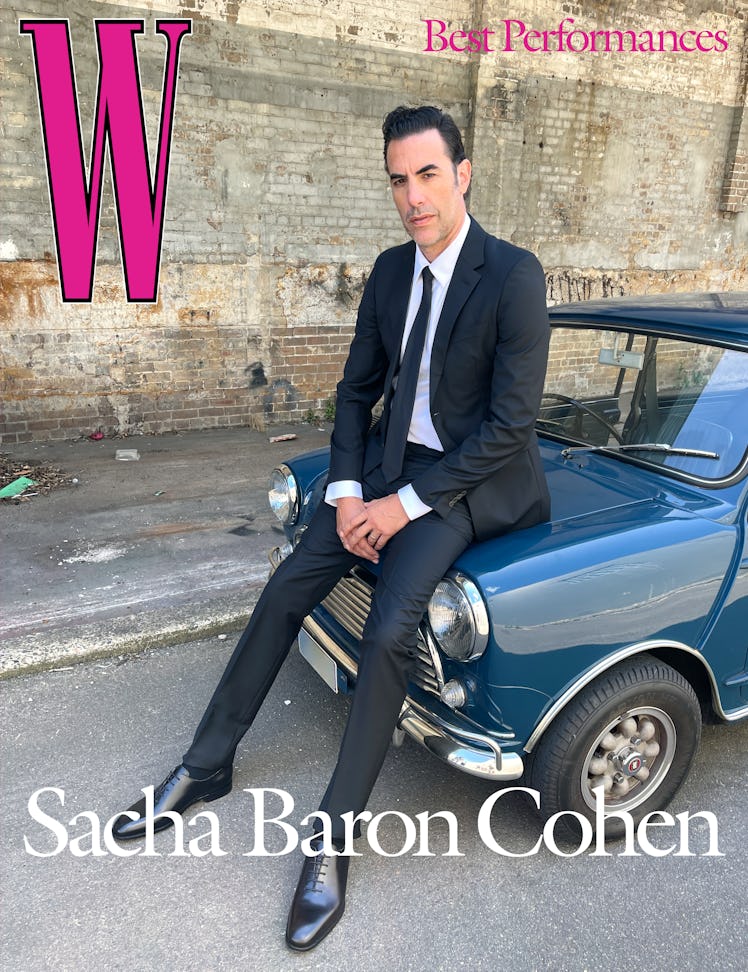What do the 1960s revolutionary Abbie Hoffman and the fictional Kazakh journalist Borat Sagdiyev have in common? For starters, both were portrayed on film last year by Sacha Baron Cohen, who has received a Golden Globe nomination for each role, in The Trial of the Chicago 7 and Borat Subsequent Moviefilm, respectively. But as different as an anti-war activist and a slapstick icon known for his neon Speedo might seem, Cohen sees a common thread between the two, in their use of comedy as a tool to highlight intolerance and hypocrisy. For W's annual Best Performances issue, Cohen reflects on two hyper-political roles in today’s contentious cultural climate.
In The Trial of the Chicago 7, you portray the anti-war activist Abbie Hoffman, who was notable both as a revolutionary and as a comedian. What drew you to the character?
I became interested in Hoffman when I was at Cambridge writing my undergraduate thesis on the Jewish radicals who fought racial injustice in America. In 1992, I was staying at the YMCA in downtown Atlanta and came across his work. I realized immediately that his one-liners and his comic antics had a higher purpose: His life was devoted to fighting against prejudice and an immoral war in Vietnam. I respected him immediately.
You were shooting Chicago 7 and Borat Subsequent Moviefilm simultaneously. Was it difficult to go back and forth between characters?
I didn’t tell anybody that I was shooting Borat at the same time. But I did find parallels with Abbie Hoffman’s actions. I read everything I could find about Abbie, and I listened to all his speeches. He was amazingly eloquent, and we have similar missions: to humble the powerful and challenge injustice. Abbie was also aware of the role of the media. He had studied the Lenny Bruce obscenity trial and knew that the trial of the Chicago 7 was political theater. He wanted to be found guilty; he wanted to go to jail. He knew that was the only way to impress America and have his anti-war message heard.
Sacha Baron Cohen wears a Prada suit, shirt, and tie; Manolo Blahnik shoes.
You write, produce, and star in your Borat films, but few people realize that you and your brother, Erran Baron Cohen, also write the songs in the movies. “Wuhan Flu” is very catchy.
That’s our goal; we try to write a song that you can’t help but sing along to, but has a really scary lyric. “Wuhan Flu” went viral, and people would post, “I can’t stop singing this awful song!” Few people know that, for a while, as Ali G, I was Britain’s highest-selling rap artist. My goal in comedy has always been the same: be very funny but reveal an indifference to racial hatred and intolerance. And it helps if you can hum along.
Were you shocked by the violent insurrection in Washington, D.C., on January 6, 2021?
Sadly, no. Conspiracy theories end in violence. Think about it: If you are fed a diet of lies, and you truly believe those lies and have faith in the person who is telling the lies to you, then the actions of January 6 are, unfortunately, logical. What we collectively need to do is stop the lies. That’s my mission.
Baron Cohen wears a Prada suit, shirt, and tie; Falke socks; Manolo Blahnik shoes; his own ring.
Hair by Travis Balcke at Saunders & Co.; skin by Liz Kelsh for Philosophy; sittings editor: Michael Azzollini; local producer: Nadene Duncan; photo assistant: Tom Ortiz. Special thanks to Steven Chee.
